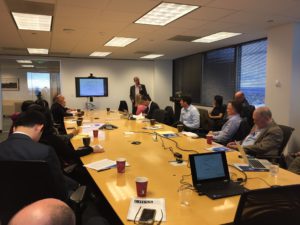
On October 9, 2018, the Washington State China Relations Council, in partnership with the National Committee on U.S.-China Relations, held the annual CHINA Town Hall featuring speakers former U.S. Secretary of State Condoleezza Rice as national webcast speaker and local speaker Andrew Batson, China Research Director at Gavekal Dragonomics, an independent economic research firm with offices in Hong Kong and Beijing. CHINA Town Hall is a national conversation about China that provides Americans across the United States and beyond the opportunity to discuss issues in the relationship with leading experts. It took place at 100+ venues across the United States and Greater China.
Condoleezza Rice served as the 66th Secretary of State of the United States, the second woman and first African American woman to hold the post. During the interactive webcast discussion moderated by Stephen A. Orlins, President of the National Committee on U.S.-China Relations, she spoke about her personal experience working in China as the Secretary of State under President George W. Bush. She highlighted the benefits of free and open trade with China, including economic growth, increased innovation, and enhanced exchange under a rules-based system. In answering a question about the current trade tensions between the United States and China, she emphasized in importance in reciprocity. Speaking about her own experience with the National Committee on U.S.-China Relations at the beginning of her career, she noted that NCUSCR was pivotal in shaping her understanding of China.
Andrew Batson’s presentation focused on the future of economic ties between China and the United States. Assessing the aims of President Trump’s administration in issuing tariffs and heightening trade tensions between the two nations, Andrew noted that volatility in the Chinese economy began to occur before the tariffs were announced. According to his research, exports remain a large portion of China’s economy, but their market dominance is declining. He pointed to similarities between the American and Chinese economies in that they are both dependent on domestic demand, as opposed to exports. In his concluding remarks, Andrew stated that if the trade war is a negotiating tactic, it is not likely to succeed. But increasingly, it appears to be an opening move in a long-term strategy to disengage the economics of the United States and China.
A spirited Q&A session followed Andrew’s presentation. Questions from attendees addressed how the trade conflict will affect business in both the United States and China, as well as implications for the Belt and Road Initiative. Andrew drew from his extensive research on the Chinese economy and detailed his projections by industry, discussing tech, agriculture, and consumer goods.
WSCRC extends thanks to WSCRC board member Sean Connell for serving as a moderator for the event and for WSCRC board member Nelson Dong at Dorsey & Whitney LLP for providing the venue.
Summary author: Mengyao Liu